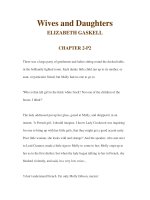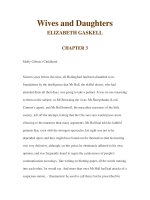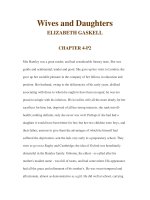Wives and Daughters ELIZABETH GASKELL CHAPTER 4-P2 docx
Bạn đang xem bản rút gọn của tài liệu. Xem và tải ngay bản đầy đủ của tài liệu tại đây (24.54 KB, 9 trang )
Wives and Daughters
ELIZABETH GASKELL
CHAPTER 4-P2
Mrs Hamley was a great reader, and had considerable literary taste. She was
gentle and sentimental; tender and good. She gave up her visits to London; she
gave up her sociable pleasure in the company of her fellows in education and
position. Her husband, owing to the deficiencies of his early years, disliked
associating with those to whom he ought to have been an equal; he was too
proud to mingle with his inferiors. He loved his wife all the more dearly for her
sacrifices for him; but, deprived of all her strong interests, she sank into ill-
health; nothing definite; only she never was well. Perhaps if she had had a
daughter it would have been better for her; but her two children were boys, and
their father, anxious to give them the advantages of which he himself had
suffered the deprivation, sent the lads very early to a preparatory school. They
were to go on to Rugby and Cambridge; the idea of Oxford was hereditarily
distasteful in the Hamley family. Osborne, the eldest - so called after his
mother's maiden name - was full of tastes, and had some talent. His appearance
had all the grace and refinement of his mother's. He was sweet-tempered and
affectionate, almost as demonstrative as a girl. He did well at school, carrying
away many prizes; and was, in a word, the pride and delight of both father and
mother; the confidential friend of the latter, in default of any other. Roger was
two years younger than Osborne; clumsy and heavily built, like his father; his
face was square, and the expression grave, and rather immobile. He was good,
but dull, his schoolmasters said. He won no prizes, but brought home a
favourable report of his conduct. When he caressed his mother, she used
laughingly to allude to the fable of the lap-dog and the donkey; so thereafter he
left off all personal demonstration of affection. It was a great question as to
whether he was to follow his brother to college after he left Rugby. Mrs Hamley
thought it would be rather a throwing away of money, as he was so little likely
to distinguish himself in intellectual pursuits; anything practical - such as a civil
engineer - would be more the line of life for him. She thought that it would be
too mortifying for him to go to the same college and university as his brother,
who was sure to distinguish himself - and, to be repeatedly plucked, to come
away wooden-spoon at last. But his father persevered doggedly, as was his
wont, in his intention of giving both his sons the same education; they should
both have the advantages of which he had been deprived. If Roger did not do
well at Cambridge it would be his own fault. If his father did not send him
thither, some day or other he might be regretting the omission, as Squire Roger
had done himself for many a year. So Roger followed his brother Osborne to
Trinity,' and Mrs Hamley was again left alone, after the year of indecision as to
Roger's destination, which had been brought on by her urgency. She had not
been able for many years to walk beyond her garden; the greater part of her life
was spent on a sofa, wheeled to the window in summer, to the fireside in winter.
The room which she inhabited was large and pleasant; four tall windows looked
out upon a lawn dotted over with flower-beds, and melting away into a small
wood, in the centre of which there was a pond, filled with water-lilies. About
this unseen pond in the deep shade Mrs Hamley had written many a pretty four-
versed poem since she lay on her sofa, alternately reading and composing
poetry. She had a small table by her side on which there were the newest works
of poetry and fiction; a pencil and blotting-book, with loose sheets of blank
paper; a vase of flowers always of her husband's gathering; winter and summer,
she had a sweet fresh nosegay every day. Her maid brought her a draught of
medicine every three hours, with a glass of clear water and a biscuit; her
husband came to her as often as his love for the open air and his labours out-of-
doors permitted; but the event of her day, when her boys were absent, was Mr
Gibson's frequent professional visits.
He knew there was real secret harm going on all this time that people spoke of
her as a merely fanciful invalid; and that one or two accused him of humouring
her fancies. But he only smiled at such accusations. He felt that his visits were a
real pleasure and lightening of her growing and indescribable discomfort; he
knew that Squire Hamley would have been only too glad if he had come every
day; and he was conscious that by careful watching of her symptoms he might
mitigate her bodily pain. Besides all these reasons, he took great pleasure in the
squire's society. Mr Gibson enjoyed the other's unreasonableness; his
quaintness; his strong conservatism in religion, politics, and morals. Mrs
Hamley tried sometimes to apologize for, or to soften away, opinions which she
fancied were offensive to the doctor, or contradictions which she thought too
abrupt; but at such times her husband would lay his great hand almost
caressingly on Mr Gibson's shoulder, and soothe his wife's anxiety, by saying,
'Let us alone, little woman. We understand each other, don't we, doctor? Why,
bless your life, he gives me better than he gets many a time; only, you see, he
sugars it over, and says a sharp thing, and pretends it's all civility and humility;
but I can tell when he's giving me a pill.'
One of Mrs Hamley's often-expressed wishes had been, that Molly might come
and pay her a visit. Mr Gibson always refused this request of hers, though he
could hardly have given his reasons for these refusals. He did not want to lose
the companionship of his child, in fact; but he put it to himself in quite a
different way. He thought her lessons and her regular course of employment
would be interrupted. The life in Mrs Hamley's heated and scented room would
not be good for the girl; Osborne and Roger Hamley would be at home, and he
did not wish Molly to be thrown too exclusively upon them for young society;
or they would not be at home, and it would be rather dull and depressing for his
girl to be all the day long with a nervous invalid.
But at length the day came when Mr Gibson rode over, and volunteered a visit
from Molly; an offer which Mrs Hamley received with the 'open arms of her
heart,' as she expressed it; and of which the duration was unspecified. And the
cause for this change in Mr Gibson's wishes was as follows: - It has been
mentioned that he took pupils, rather against his inclination, it is true; but there
they were, a Mr Wynne and Mr Coxe, 'the young gentlemen,' as they were
called in the household; 'Mr Gibson's young gentlemen,' as they were termed in
the town. Mr Wynne was the elder, the more experienced one, who could
occasionally take his master's place, and who gained experience by visiting the
poor, and the 'chronic cases.' Mr Gibson used to talk over his practice with Mr
Wynne, and try and elicit his opinions in the vain hope that, some day or
another, Mr Wynne might start an original thought. The young man was
cautious and slow; he would never do any harm by his rashness, but at the same
time he would always be a little behind his day. Still Mr Gibson remembered
that he had had far worse 'young gentlemen' to deal with; and was content with,
if not thankful for, such an elder pupil as Mr Wynne. Mr Coxe was a boy of
nineteen or so, with brilliant red hair, and a tolerably red face, of both of which
he was very conscious and much ashamed. He was the son of an Indian officer,
an old acquaintance of Mr Gibson's. Major Coxe was at some unpronounceable
station in the Punjaub, at the present time; but the year before he had been in
England, and had repeatedly expressed his great satisfaction at having placed
his only child as a pupil to his old friend, and had in fact almost charged Mr
Gibson with the guardianship as well as the instruction of his boy, giving him
many injunctions which he thought were special in this case; but which Mr
Gibson with a touch of annoyance assured the major were always attended to in
every case, with every pupil. But when the poor major ventured to beg that his
boy might be considered as one of the family, and that he might spend his
evenings in the drawing-room instead of the surgery, Mr Gibson turned upon
him with a direct refusal.
'He must live like the others. I can't have the pestle and mortar carried into the
drawing-room, and the place smelling of aloes.'
'Must my boy make pills himself, then?' asked the major, ruefully.
'To be sure. The youngest apprentice always does. It's not hard work. He'll have
the comfort of thinking he won't have to swallow them himself. And he'll have
the run of the pomfret cakes, and the conserve of hips, and on Sundays he shall
have a taste of tamarinds to reward him for his weekly labour at pill-making.'
Major Coxe was not quite sure whether Mr Gibson was not laughing at him in
his sleeve; but things were so far arranged, and the real advantages were so
great that he thought it was best to take no notice, but even to submit to the
indignity of pill-making. He was consoled for all these rubs by Mr Gibson's
manner at last when the supreme moment of final parting arrived. The doctor
did not say much; but there was something of real sympathy in his manner that
spoke straight to the father's heart, and an implied 'you have trusted me with
your boy, and I have accepted the trust in full,' in each of the last few words.
Mr Gibson knew his business and human nature too well to distinguish young
Coxe by any overt marks of favouritism; but he could not help showing the lad
occasionally that he regarded him with especial interest as the son of a friend.
Besides this claim upon his regard, there was something about the young man
himself that pleased Mr Gibson. He was rash and impulsive, apt to speak,
hitting the nail on the head sometimes with unconscious cleverness, at other
times making gross and startling blunders. Mr Gibson used to tell him that his
motto would always be 'kill or cure,' and to this Mr Coxe once made answer that
he thought it was the best motto a doctor could have; for if he could not cure the
patient, it was surely best to get him out of his misery quietly, and at once. Mr
Wynne looked up in surprise, and observed that he should be afraid that such
putting out of misery might be looked upon as homicide by some people. Mr
Gibson said in a dry tone, that for his part he should not mind the imputation of
homicide, but that it would not do to make away with profitable patients in so
speedy a manner; and that he thought that as long as they were willing and able
to pay two-and-sixpence for the doctor's visit, it was his duty to keep them
alive; of course, when they became paupers the case was different. Mr Wynne
pondered over this speech; Mr Coxe only laughed. At last Mr Wynne said, -
'But you go every morning, sir, before breakfast to see old Nancy Grant, and
you've ordered her this medicine, sir, which is about the most costly in Corbyn's
bill?'
'Have you not found out how difficult it is for men to live up to their precepts?
You've a great deal to learn yet, Mr Wynne!' said Mr Gibson, leaving the
surgery as he spoke.
'I never can make the governor out,' said Mr Wynne, in a tone of utter despair.
'What are you laughing at, Coxey?'
'Oh! I'm thinking how blest you are in having parents who have instilled moral
principles into your youthful bosom. You'd go and be poisoning all the paupers
off, if you hadn't been told that murder was a crime by your mother; you'd be
thinking you were doing as you were bid, and quote old Gibson's words when
you came to be tried. "Please, my lord judge, they were not able to pay for my
visits, and so I followed the rules of the profession as taught me by Mr Gibson,
the great surgeon at Hollingford, and poisoned the paupers." '
'I can't bear that scoffing way of his.'
'And I like it. If it wasn't for the governor's fun, and the tamarinds, and
something else that I know of, I would run off to India. I hate stifling rooms,
and sick people, and the smell of drugs, and the stink of pills on my hands; -
faugh!'









